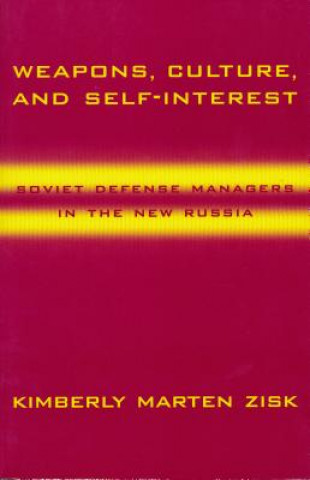
Dostava
Savjetnik za kupnju





Proizvod vam ne odgovara? Nema veze! Možete nam vratiti unutar 30 dana
 Poklon bon
u bilo kojoj vrijednosti
Poklon bon
u bilo kojoj vrijednosti
S poklon bonom ne možete pogriješiti. Za poklon bon primatelj može odabrati bilo što iz naše ponude.
Weapons, Culture, and Self-Interest
 Engleski
Engleski
 318 b
318 b
30 dana za povrat kupljenih proizvoda
Moglo bi vas zanimati i


How do powerful people react to revolutionary circumstances? How quickly and effectively do elites adapt to, and shape, the structures of new social and political systems? Zisk offers a detailed examination of the unexpected ways Russian defense industrialists have acted in the new market economy. Bridging the gap between political economy and international security studies, Zisk plunges into the debate of whether rational self-interest or broader cultural norms explain behaviour best. She focuses on three institutions that structured the Russian defense manager's working life in the 1992-95 transition era: the large defence enterprises dating from Soviet times; the webs of political authority spanning both local and national levels; and the newly emerged, market-oriented spin-off firms. Zisk shows that the combination of opportunism and social conditioning, when coupled with the massive decline in the Russian defense budget, encourages both illegal arms sales and social unrest in Russia's defense-heavy regions. In the transition from central planning to the market, Russian defense managers have had to figure out how best to survive. By taking advantage of two new trends - local and regional autonomy, and the absence of financial stability - Russian defense factories are attracting any and all customers, leaving the Russian state unable to control weapons production and sales. Zisk concludes that the collectivist Soviet culture had only limited impact on even those most comfortable within it; managers, workers and officials have all pursued individual gain in the new system. At the same time, the Soviet legacy of paternalism continues to matter in the workplace and gives Russian capitalism a unique flavour. For scholars and students of international security, post-socialist transitions, and political economy and culture, this book offers a new insight into post-Soviet culture.
Informacije o knjizi
 Engleski
Engleski
Kategorija




 Kako kupovati
Kako kupovati


























